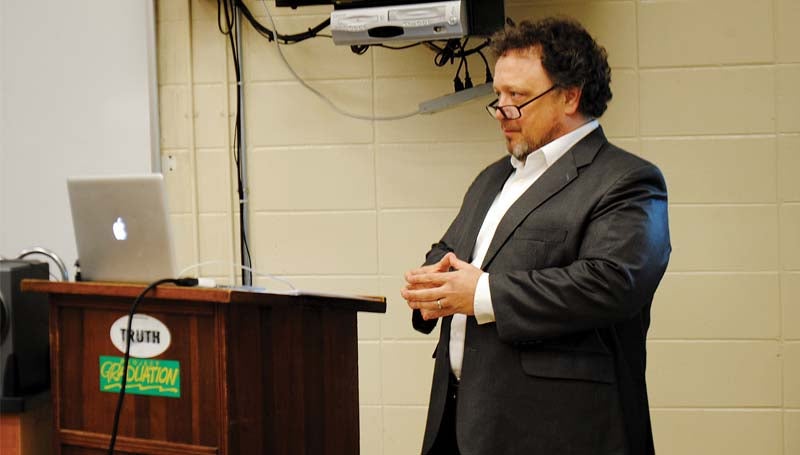Remembering a giant of history: Winston Churchill topic of lecture at Co-Lin classes
Published 11:25 am Thursday, March 27, 2014

DAILY LEADER / JUSTIN VICORY / During a presentation on Winston Churchill at Copiah-Lincoln Community College Wednesday, Dr. Michael Reinhard suggests audience members incorporate leadership qualities of Churchill in their own lives.
In early June 2014, 70 years will have transpired since the D-Day Invasion, a major battle in a war that scores of Lincoln County and Brookhaven veterans participated in, many still alive today.
In part due to the extraordinary times during World War II, but mainly because of his unique character, former British Prime Minister Winston Churchill remains an inspiration to people to this day, including students at Copiah-Lincoln Community College.
History Instructor Brett Shufelt brought guest speaker, Michael Reinhard, a professor of political science at Millsaps College, to Co-Lin to attempt to ignite an interest in the history and times of Churchill. Reinhard’s lecture, titled “Winston Churchill: Lessons in Leadership,” lasted just over an hour and was delivered to a packed classroom auditorium.
“Humanity faced a turning point, and Churchill is responsible for mobilizing the masses and managing war efforts. Churchill was a great speaker, effective politician, efficient manager and a respectable man,” said Reinhard.
The lessons of Churchill have not fallen into the dustbin of history, Reinhard noted, and many of the traits and characteristics of Churchill can be applied to the lives of young and old.
Churchill was instrumental in getting the United States to participate in the war from the very beginning, despite a large isolationist perspective. More than 3,000 letters were written between Churchill and U.S. President Franklin D. Roosevelt during the war, according to Reinhard.
Churchill’s ability to convince Roosevelt of what was at stake, especially in the war’s earlier years, proved vital to Great Britain when it came to raw materials which were shipped across the Atlantic. One of Churchill’s continued arguments was to show a shared fate between the two nations.
After the Pearl Harbor bombing, such an understanding was instantly shared. Before that time, Churchill worked tirelessly to unite the two nations, resulting in a close geopolitical bond shared to this day.
This ability to convince, with an uncanny determination and focus, is just one of the characteristics that Reinhard spoke about during his one-hour lecture.
Churchill’s unwavering suspicion of Hitler would prove correct, but many of Great Britain’s political representatives considered capitulating to his requests at the time.
“It’s much easier to side with Churchill now, given what we now know about what he was doing. However, at the time, Hitler’s political requests were considered by many of Great Britain’s politicians. Churchill was one of the few that opposed Hitler then,” Reinhard said.
One of Churchill’s greatest strengths, one that isn’t necessarily talked about much, was his management abilities, he added. “Churchill was an incredibly efficient manager. He was able to get more out of people. He was able to convince them to exceed their own expectations. He was instrumental in galvanizing the British public into the war effort.”
Other characteristics of Churchill that Reinhard mentioned at Wednesday’s lecture included Churchill’s rhetorical talent, one that has left hundreds of quotations and writings behind.
For the entire month of March and into April, in honor of the former prime minister, Co-Lin history instructor Brett Shufelt has been putting together several events to commemorate Churchill. Besides Wednesday’s lecture, 15 Co-Lin students will be attending the 31st International Churchill Conference titled “Churchill: Fighting and Writing” in New Orleans April 4-5.

